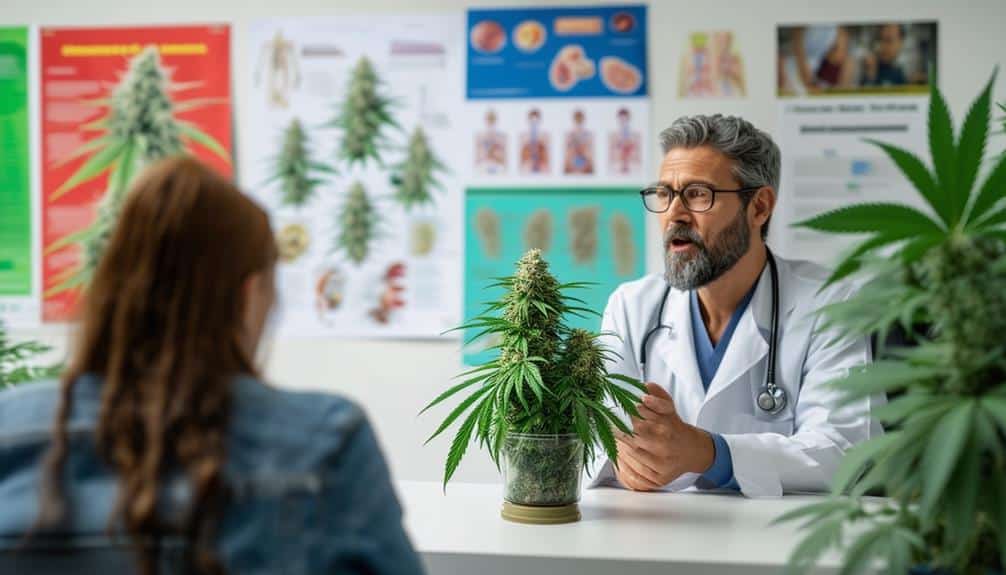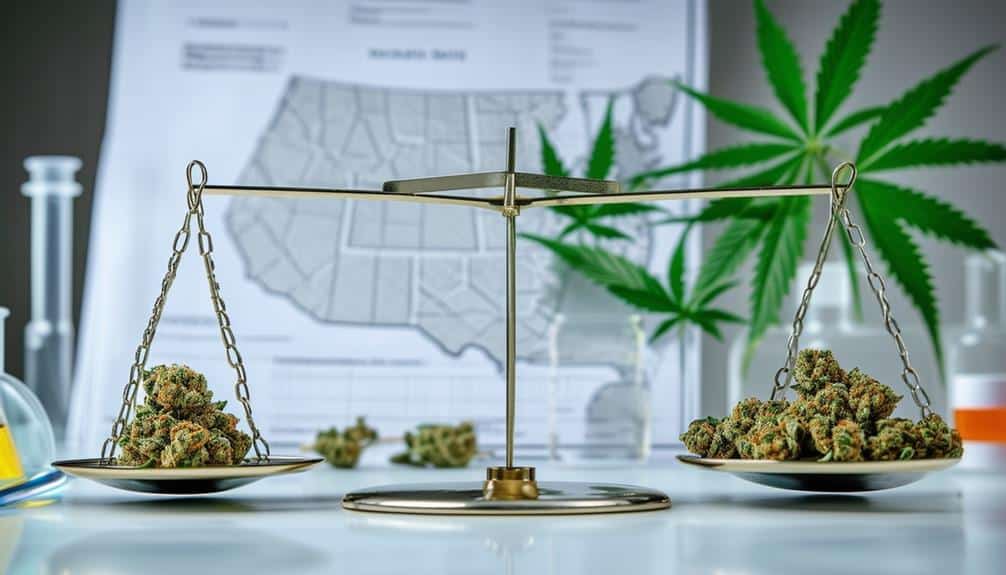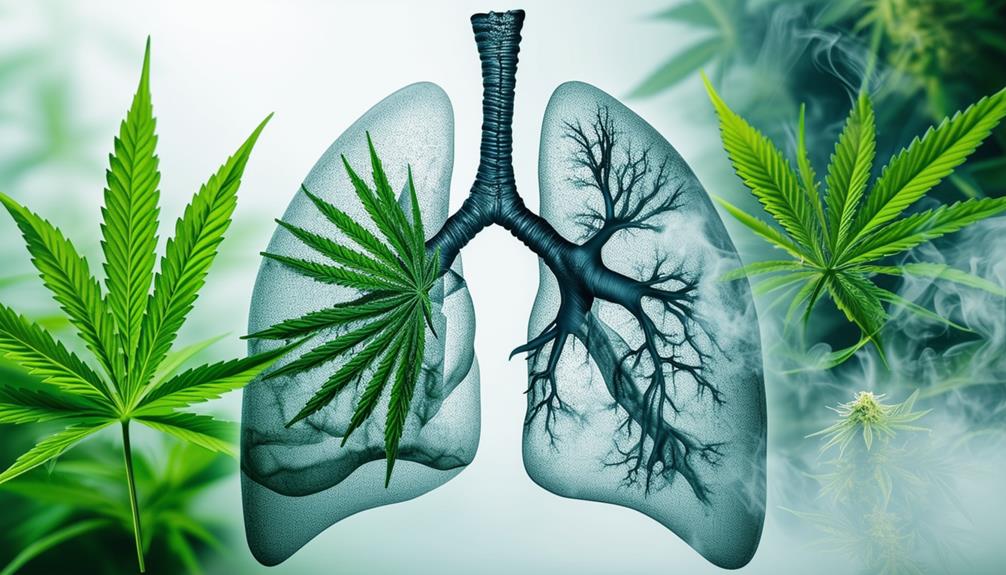If you’ve ever questioned whether medical marijuana is genuinely addictive or if it’s only for severe pain, you’re not alone. Many Delaware residents wrestle with these misconceptions and more. What if I told you that scientific evidence debunks these myths, demonstrating that medical marijuana serves as a valuable tool for managing various health conditions? From its role in mental health treatment to its impact on reducing healthcare costs and opioid-related issues, there’s much to discover. So let’s address these common myths and see how medical marijuana can actually benefit your healthcare needs.
Medical Marijuana Is Addictive

Contrary to popular belief, medical marijuana isn’t inherently addictive when used responsibly under medical supervision. Research has shown that the potential for addiction from medical marijuana is significantly lower compared to substances like opioids or alcohol.
The medicinal benefits of cannabis are numerous, especially for conditions such as chronic pain, epilepsy, and multiple sclerosis. These benefits are maximized when patients adhere to prescribed dosages and guidelines provided by healthcare professionals.
Legal regulations play a crucial role in ensuring the safe use of medical marijuana. In Delaware, for instance, the Medical Marijuana Act mandates that patients must obtain a recommendation from a licensed physician and register with the Delaware Medical Marijuana Program. This framework helps monitor use and prevent abuse, ensuring that you and other patients receive therapeutic benefits without the risk of developing dependency.
Only for Severe Pain
While it’s true that medical marijuana is effective for severe pain, it’s a misconception that this is its only application. Medical marijuana offers significant benefits for a range of chronic conditions beyond just pain management. Conditions like multiple sclerosis, epilepsy, and Crohn’s disease can also be alleviated with medical marijuana under proper medical oversight.
For patients suffering from these chronic conditions, alternative treatments often fail to provide relief. Medical marijuana offers another option, often with fewer side effects compared to traditional pharmaceuticals. Understanding that medical marijuana is versatile is crucial; it provides relief for muscle spasms, nausea, and even anxiety.
Dosage options are varied and can be tailored to individual needs, ensuring that each patient receives the most suitable treatment. From tinctures to edibles, the range of available products allows for personalized care plans.
It’s crucial to dispel the myth that medical marijuana is a one-size-fits-all solution only for severe pain. With proper medical supervision, it can serve as a valuable component in a comprehensive treatment plan for various chronic conditions; offering a safer and often more efficient alternative to traditional medications.
No Scientific Evidence

Numerous peer-reviewed studies have substantiated the therapeutic benefits of medical marijuana for various health conditions. Contrary to the myth that there’s no scientific evidence supporting its use, extensive research highlights its efficacy in managing chronic pain, reducing nausea in chemotherapy patients and alleviating symptoms in multiple sclerosis.
For instance, a study published in the Journal of the American Medical Association found that cannabinoids notably improve pain outcomes. Another research in The Lancet Neurology confirmed that medical marijuana can reduce muscle spasticity in multiple sclerosis patients. These findings are pivotal for Delaware residents considering the legal status and medical benefits of medical marijuana.
You might wonder about the legal status and how it influences accessibility. In Delaware, medical marijuana is legal, allowing patients to benefit from its therapeutic properties. The state’s regulations ensure that you can access high-quality, controlled dosages, thereby maximizing medical benefits while minimizing potential risks.
Moreover, the National Academies of Sciences, Engineering, and Medicine reviewed over 10,000 studies and concluded that there’s substantial evidence supporting the use of cannabis for chronic pain treatment.
Gateway to Hard Drugs
Despite substantial evidence supporting medical marijuana’s therapeutic benefits, some still argue that its use can act as a gateway to harder drugs. This myth has been debunked by numerous scientific studies showing no direct causal link between medical marijuana and subsequent use of more dangerous substances.
In fact, medical marijuana can play an essential role in managing mental health conditions like anxiety and depression; offering a safer alternative to opioids and other prescription drugs with higher addiction potentials.
When considering economic impact; it’s important to recognize that legalizing medical marijuana can actually reduce financial burden on healthcare systems. By providing a viable alternative for pain management and mental health treatment; patients can avoid high costs associated with more severe health issues stemming from substance abuse disorders.
Additionally; states with medical marijuana programs have reported decrease in opioid-related hospitalizations and fatalities further underscoring its benefits.
Causes Lung Cancer

Many individuals believe that smoking medical marijuana leads to lung cancer, but scientific research doesn’t support this assertion. While inhaling any combusted substance can introduce harmful chemicals into the lungs, studies haven’t definitively connected marijuana smoke with lung cancer.
Research indicates that smoking marijuana involves different mechanisms than tobacco smoking, which is a known carcinogen.
As a healthcare professional or someone dedicated to serving others, understanding these distinctions is vital. Some studies suggest that marijuana contains compounds that might have anti-carcinogenic properties. However, it’s crucial to take into account individual health factors such as pre-existing conditions which can influence how one’s body reacts to any form of smoke.
Secondhand exposure to marijuana smoke presents another concern. While it’s less studied than tobacco smoke; the limited data available doesn’t indicate a significant risk of lung cancer from secondhand marijuana smoke.
Nevertheless; it’s prudent to minimize exposure especially for individuals with respiratory issues or compromised immune systems.
Only Smoked or Vaped
Beyond concerns about lung cancer; it’s a common misconception that medical marijuana can only be administered through smoking or vaping. In reality there are several alternative methods of consumption that can provide therapeutic benefits of cannabis without potential respiratory side effects associated with inhalation.
One popular method is edible consumption. Edibles such as gummies chocolates and beverages deliver cannabinoids like THC and CBD through digestive system. This allows for slower onset of effects which can be beneficial for managing chronic pain or insomnia. However it’s essential to be aware that intensity and duration of effects can vary necessitating careful dosing.
Topicals are another effective option. These are cannabis-infused creams balms and lotions applied directly to skin. They’re particularly useful for localized relief from pain inflammation or skin conditions. The cannabinoids in topicals interact with receptors in the skin but don’t enter bloodstream minimizing psychoactive side effects.
Legalization Increases Crime

Claims that legalizing medical marijuana increases crime rates aren’t supported by empirical evidence. Extensive studies and statistical analyses reveal no significant uptick in crime rates following legalization. In fact, community safety often remains stable or improves as regulated dispensaries replace illegal markets reducing associated criminal activities.
You might be concerned about public perception but it’s important to ponder the data. Research conducted in states with legalized medical marijuana shows a neutral or even positive impact on crime rates. Law enforcement officials report that their resources can be redirected to more serious crimes enhancing overall community safety.
Moreover, regulatory frameworks established in states that have legalized medical marijuana are designed to prevent misuse and promote compliance. These measures help mitigate any potential risks that could affect crime rates. By prioritizing public health and safety these regulations foster a more secure environment.
It’s critical to base our understanding on evidence rather than misconceptions. As someone devoted to serving others you’ll appreciate informed decisions and policies can lead safer healthier communities. Law enforcement and policymakers should rely on data-driven insights to guide their practices and reassure the public.
All Users Get High
Contrary to popular belief not all users of medical marijuana experience a psychoactive ‘high.’ This misconception often arises from confusing medical marijuana with recreational cannabis. Medical marijuana patients typically use strains and formulations with higher levels of CBD (cannabidiol) and lower levels of THC (tetrahydrocannabinol).
CBD is non-psychoactive and offers numerous medical benefits such as reducing inflammation alleviating anxiety and managing chronic pain without altering your state of mind.
For those concerned about psychoactive effects alternative options are available. Products such as CBD oils tinctures and capsules provide therapeutic benefits without the ‘high’ associated with THC. These options are particularly useful for patients who need relief but must maintain mental clarity for daily responsibilities.
Moreover, medical marijuana can be administered through methods like topical creams and transdermal patches which deliver cannabinoids directly to affected area without entering bloodstream. This guarantees you can reap the medical benefits without experiencing psychoactive effects.
Understanding diverse applications and formulations of medical marijuana helps dispel myth that all users get high. By tailoring treatments to individual needs you can better serve your community providing effective non-intoxicating pain relief solutions.
Ineffective for Children

Research has shown that medical marijuana can be an effective treatment option for certain pediatric conditions such as epilepsy and severe chronic pain. As a Delaware resident committed to serving others you should be aware that this isn’t just anecdotal evidence. Clinical studies have demonstrated significant reductions in seizure frequency and intensity in children using cannabis-derived products particularly cannabidiol (CBD). For parents seeking medicinal alternatives these findings can be a beacon of hope.
However it’s important to recognize significance of age restrictions and professional oversight. The Delaware Medical Marijuana Act stipulates specific guidelines for pediatric use ensuring that only qualified healthcare providers can recommend cannabis for minors. This guarantees that the treatment is tailored to child’s unique medical needs minimizing potential risks.
Moreover medicinal alternatives like medical marijuana are often considered when conventional treatments have failed. It provides viable option for children suffering from debilitating conditions thereby improving their quality of life.
As you advocate for compassionate care it’s vital to debunk myth that medical marijuana is ineffective for children. Instead focus on evidence and regulated pathways that can offer relief to young patients in need.
Leads to Cognitive Decline
Concerns about medical marijuana leading to cognitive decline often stem from misunderstandings about its effects on brain. It’s important differentiate between recreational use which involves high THC levels and medical use which is controlled and often includes higher CBD concentrations.
CBD or cannabidiol has shown potential benefits for mental health including reducing anxiety improving mood without psychoactive effects linked to THC.
Research on impact of medical marijuana on cognitive functions like memory loss is still evolving. However studies indicate low moderate THC levels commonly found in medical formulations are less likely impair cognitive functions. In fact some evidence suggests medical marijuana may even protect brain by reducing inflammation oxidative stress.
For patients managing chronic pain epilepsy PTSD cognitive benefits symptom relief may outweigh minimal risk cognitive decline. When used under medical supervision therapeutic advantages are substantial.
You should consult healthcare professionals to guarantee treatment plan minimizes any potential risks.
Conclusion
Don’t let myths cloud your judgment. Medical marijuana is well-researched effective treatment offering lifeline to many. It’s not monster lurking in your medicine cabinet but trusted ally in battle against numerous health conditions.
By understanding its true potential you’re opening door to world of relief improved well-being. Embrace science trust evidence consider medical marijuana as viable safe option for your healthcare needs.
If you’re curious learn more I invite you visit us at Cannabis Docs of Delaware. We’re here provide information support you need. Feel free give us call at (855) 420-6797. We’d love help you explore how medical marijuana might be right fit for your healthcare needs!
The post Common Myths About Medical Marijuana Debunked for Delaware Residents appeared first on Delaware Cannabis Docs.
source https://delawarecannabisdocs.com/common-myths-about-medical-marijuana-debunked-for-delaware-residents/

No comments:
Post a Comment